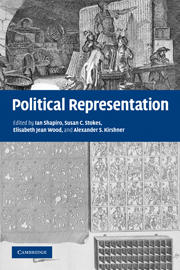Book contents
- Frontmatter
- Contents
- List of figures
- List of tables
- List of contributors
- Preface
- Editors' introduction
- Part I Representation before representative democracy
- Part II Theories of political representation
- Part III Representation and inherited injustice
- Part IV What role for representative quotas?
- 8 Perverse consequences? The impact of quotas for women on democratization in Africa
- 9 On quotas and qualifications for office
- Part V Preferences, persuasion, and democratic representation
- Index
- References
9 - On quotas and qualifications for office
Published online by Cambridge University Press: 05 June 2012
- Frontmatter
- Contents
- List of figures
- List of tables
- List of contributors
- Preface
- Editors' introduction
- Part I Representation before representative democracy
- Part II Theories of political representation
- Part III Representation and inherited injustice
- Part IV What role for representative quotas?
- 8 Perverse consequences? The impact of quotas for women on democratization in Africa
- 9 On quotas and qualifications for office
- Part V Preferences, persuasion, and democratic representation
- Index
- References
Summary
Introduction
In every existing democracy, qualifications for office restrict who may run for various elected offices. Most frequently, these qualifications require that the candidate be older than a certain minimal age, that she be a citizen of the nation in which she is running, and that she be a member of the party or resident of the district that she stands to represent. Increasingly, qualifications for office are being crafted based on gender, race, and ethnicity. In the last twenty years, dozens of democratic governments around the globe have established secured seats in the legislature or on party lists for women (Baldez 2004; Krook 2006). And the effect of other rules and circumstances – such as the need for large sums of money to mount a campaign in the United States – has created virtual qualifications for office, stacking the deck in favor of some kinds of candidates at the expense of others.
The use of qualifications is hardly new, nor is the desire to use them to achieve desirable results. For example, on December 4, 1820, in a debate on alterations to the Massachusetts State Constitution, Daniel Webster defended the inclusion of a “profession of belief” in Christian principles as a qualification for office (Webster 1903). As a general matter, Webster argued, the use of qualifications for office was consistent with principles of representative government that depended on voters themselves making good principled judgments about the types of people who should represent them.
- Type
- Chapter
- Information
- Political Representation , pp. 236 - 268Publisher: Cambridge University PressPrint publication year: 2010
References
- 11
- Cited by

